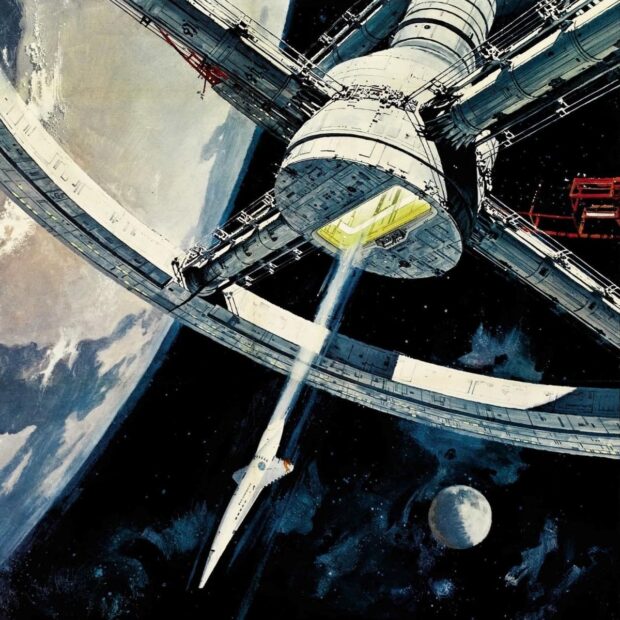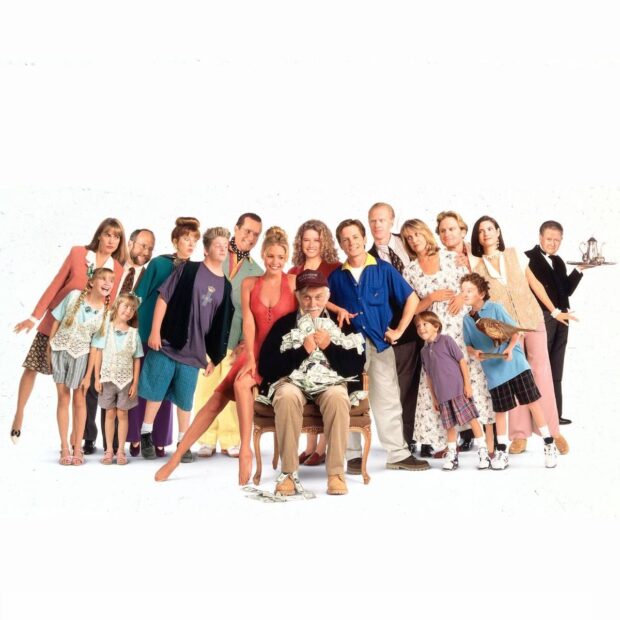Cloudy with a chance of Doom.
Nobody’s ever finished watching Fantastic Four: Rise of the Silver Surfer marvelling at the audacity of its Galactus. Which is a shame, really, because for a film that dares to bring the Skyrider of the Spaceways to multiplex audiences, it spends an extraordinary amount of time pretending it hasn’t. It’s a curious constraint for a movie that otherwise takes such an earnest swing at the gleaming, Kirby-infused optimism of early Marvel and gets the Silver Surfer himself pretty much spot-on.
That ambivalence – between sincerity and second-guessing – shapes the film’s identity more than it probably intends. But Rise of the Silver Surfer also benefits from the kind of thing superhero franchises often take for granted: a main cast who actually get along. Ioan Gruffudd, Jessica Alba, Chris Evans, and Michael Chiklis settle back into their roles with the relaxed chemistry of a sitcom ensemble on their third series, no small feat given how stiff some of the dialogue still is. But their comfort with each other helps sand down the comic-book broadness without undercutting its appeal.
Evans already knows how to add dimension to Johnny Storm’s peacocking without deflating the character’s cockiness. Gruffudd does his best with the film’s particular fondness for ‘Reed Richards, flustered science obsessive’, and Chiklis once again sells the suit through sheer charm and dogged sincerity. Alba’s Susan Storm still gets the shortest straw; her powers, while thankfully spared the worst of the first film’s wardrobe mishaps, still prove challenging to articulate on screen instead of on the page, and the subplot about her and Reed’s impending marriage sometimes feels stitched together from discarded Friends drafts but she makes more headway this time, especially when given space to play the team’s emotional centre and their bridgehead to the Silver Surfer’s conscience.
And that’s the heartbeat Rise of the Silver Surfer leans into. This isn’t a film about saving the world because it must be saved. It’s a film about saving the world because it’s your home, because the people you love live there, and because the stranger who came to help destroy it has never had anyone fight for him before. Doug Jones’ physical performance, married to Laurence Fishburne’s sombre voice work, gives the Surfer a gravitas that refuses to be cowed by the CGI around him and his scenes with Susan hint at an emotional register the rest of the film can’t always maintain but is better for attempting.
The problem is though, every time Rise of the Silver Surfer edges close to letting its story and characters lift off into the cosmic realm it teases, it pulls itself back down to Earth, quickly reverting to the technobabble language of meteorologists and military men. Galactus, the literal devourer of worlds, becomes a high-concept storm cloud with a solar-system-sized appetite and no personality. It’s not mysterious, nor majestic, just a really big iteration of the superhero finale trope “big energy vortex” although there is a blink-and-you’ll-miss-it hint of a shadow in the storm cloud that allows for the possibility of comic-accurate Galactus at the heart of the cloud, if you squint and really believe. It’s the same lack of confidence in the comic books that plagued the X-Men films and most of Fox’s output right up until the point control slipped away from them.
With that absence of an identifiable villain in favour of a diffuse force of galactic nature, the re-use of Julian McMahon’s Victor Von Doom feels as predictable as it is disappointing. He’s brought back with no real consequence or character progression, freed from his metallic tomb by a stray cosmic contrivance, and immediately reverts to moustache-twirling obviousness. His blatant mendacity makes the military’s embrace of his advice potentially the most credibility-straining thing in the whole movie. As it did with the first Fantastic Four, the film offers us a swaggering corporate sleazeball Doom with none of the philosophical or emotional depth that makes him such a compelling foil in the comics.
But maybe the villains are all a sideshow anyway. There’s a case to be made – albeit quietly – that Rise of the Silver Surfer is, at its core, a romance. Not just between Reed and Sue, who finally make it to the altar by way of various save-the-world detours, but between the film and the notion that power, no matter how cosmic and seemingly unstoppable, can be redirected by compassion. It’s a classic Silver Surfer theme; it just gets rendered here in a way that’s a little too scared of commitment.
Even with that handbrake left on, though, the film still manages to pick up enough speed to be fun. Its 92-minute runtime is a minor miracle these days for a superhero movie, and its refusal to inflate its own importance is quietly refreshing. There’s a sweet-natured efficiency to its action: build a set piece, blow it up, crack a joke and move on that owes more to 90s blockbusters than the sprawling, interconnected self-seriousness that was just around the corner. While it may have flubbed the chance to embrace the full comic-book splendour of Galactus himself, elsewhere it gleefully embraces its source material. We get the first on-screen appearance of the Fantasticar and there’s a lot of fun to be had with the very comic-book sub-plot about the Fantastic Four swapping powers, but the disappointment of Galactus’ no-show continues to dominate the film’s reputation, and not unfairly. Turning a towering icon into a CGI space cyclone was always going to read as risk-averse but Rise of the Silver Surfer deserves more credit than it gets for making the attempt at all. It reaches for the cosmic and lands, like Luton claiming to be a London airport, somewhere adjacent to it, never evoking the celestial sweep of Kirby’s best panels, but certainly better than its clouded legacy suggests.












